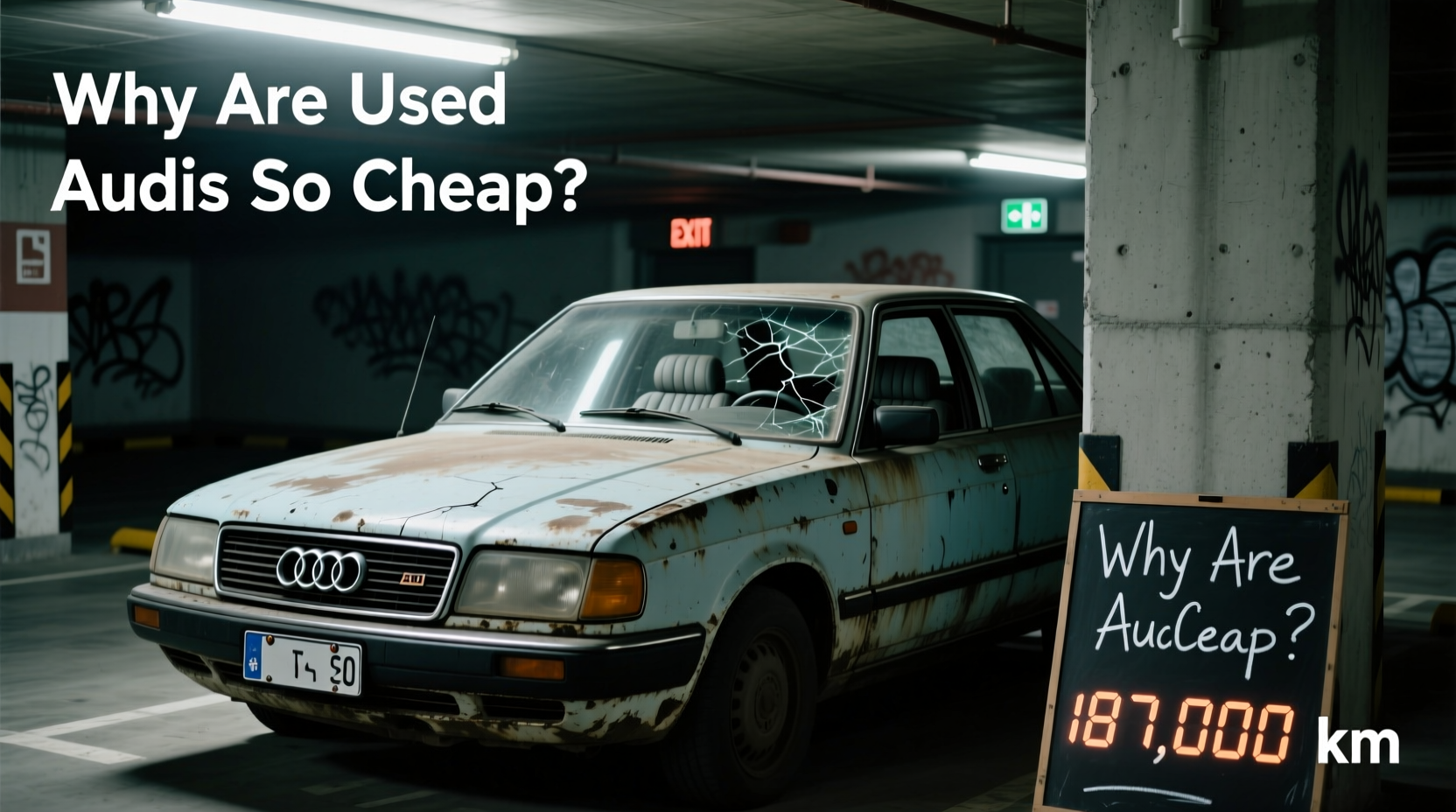It’s no secret that used Audis often appear surprisingly affordable—sometimes shockingly so. A five-year-old Audi A4 with premium features can list for thousands less than a comparable BMW or Mercedes-Benz. While this makes them tempting for budget-conscious luxury seekers, the low price tags come with important caveats. Understanding why used Audis depreciate so rapidly—and what trade-offs buyers face—is essential to making a smart purchase.
The appeal of German engineering, Quattro all-wheel drive, and sleek interiors draws many toward Audi. But once these vehicles hit the secondhand market, their value drops steeply. This article breaks down the real reasons behind the low pricing, highlights critical considerations before buying, and offers practical advice to avoid costly surprises.
Why Do Used Audis Depreciate So Quickly?

Depreciation is the primary reason used Audis seem “cheap.” On average, an Audi loses 50–60% of its value within the first five years—a steeper drop than most mainstream brands and even some rival luxury marques. Several interconnected factors drive this rapid devaluation.
- High Initial Pricing: New Audis carry premium MSRPs. Once they’re no longer new, the psychological and financial leap from “new luxury” to “used car” creates a sharp perceived loss in value.
- Perceived Maintenance Costs: Buyers know Audis require specialized service and pricier parts. This fear drives down demand and, consequently, resale prices.
- Lease Culture: A large percentage of new Audis are leased rather than purchased. When leases end, these cars flood the certified pre-owned (CPO) market simultaneously, increasing supply and lowering prices.
- Reliability Perception: Despite improvements in recent years, Audi has historically trailed Lexus and Toyota in long-term reliability rankings. Even if a specific model is dependable, the brand stigma persists.
What Hidden Costs Should You Expect?
A low sticker price doesn’t mean a low cost of ownership. Many buyers underestimate the expenses tied to maintaining an Audi over time. These costs turn seemingly “cheap” deals into expensive commitments.
Common high-cost areas include:
- Electronics: Infotainment systems, sensors, and driver-assist tech are complex and expensive to repair or replace.
- Suspension Components: Adaptive air suspensions, common on higher trims, can cost $1,000+ per corner to fix.
- Timing Belts/Chains: On certain four-cylinder engines, timing belt replacement is recommended every 70,000–90,000 miles and can exceed $800.
- Brake Systems: Larger rotors, performance pads, and electronic parking brakes increase labor and part costs.
“Luxury depreciation can be a bargain—but only if you budget for ownership beyond the purchase price.” — Daniel Reeves, Automotive Economist at Kelley Blue Book
Key Factors to Consider Before Buying a Used Audi
Purchasing a used Audi isn’t inherently risky, but it demands more diligence than buying a mainstream sedan. The following checklist outlines what savvy buyers should evaluate.
Pre-Purchase Checklist
- Obtain a complete service history—look for consistent maintenance records.
- Verify if major services (timing belt, spark plugs, transmission fluid) have been completed.
- Check for active recalls via the NHTSA website using the VIN.
- Inspect for oil leaks—common around valve covers and turbocharger lines on older models.
- Test all electronics: climate control, MMI system, backup camera, and adaptive cruise.
- Review Carfax or AutoCheck for accidents, title issues, or frequent ownership.
- Have an independent mechanic perform a pre-purchase inspection—preferably one familiar with European vehicles.
Model-Specific Reliability: What Holds Up, What Doesn’t
Not all Audis are created equal. Some models have earned reputations for durability, while others are known for chronic issues. Knowing which generations improved helps target smarter buys.
| Model | Recommended Years | Known Issues | Ownership Tip |
|---|---|---|---|
| Audi A4 | 2017–2020 (B9 generation) | Oil consumption in early 2.0T engines; DSG transmission shudder | Avoid pre-2013 models unless well-maintained; B9 is most reliable |
| Audi Q5 | 2018–2021 | Air suspension failure; MMI software glitches | Opt for steel-spring suspension to reduce repair risk |
| Audi A6 | 2019–2022 (C8) | Complex electrical architecture; costly sensor replacements | Budget for software updates and module diagnostics |
| Audi TT | 2008–2014 (Mk2), 2016–2023 (Mk3) | DSG reliability concerns; limited cargo space | Fewer electronics in Mk2; simpler to maintain |
Real Buyer Example: A Cautionary Tale
Mark, a teacher in Colorado, found a 2016 Audi A4 Quattro for $14,500—$3,000 below market average. It had low mileage and looked pristine. Excited by the deal, he skipped a third-party inspection. Within three months, the car began displaying multiple warning lights. Diagnosis: failed turbocharger and clogged PCV system. Repairs totaled $3,200. Later, he discovered the previous owner had neglected key services. The “bargain” ended up costing him nearly as much as a newer, better-maintained model would have.
His experience underscores a vital rule: when a used Audi seems too good to be true, investigate deeper. Low price often reflects hidden liabilities.
Step-by-Step Guide to Buying a Smart Used Audi
Follow this timeline to minimize risk and maximize value:
- Define Your Budget (Including Ownership): Set a purchase limit, then add $2,000–$3,000 for immediate repairs and maintenance.
- Research Target Models: Focus on generations with strong reliability ratings (e.g., B9 A4, C7.5 A6).
- Find Candidates: Search CPO listings, private sellers, and dealer inventories. Prioritize vehicles with full service histories.
- Run a VIN Check: Use Carfax or AutoCheck to uncover accident history, title branding, or odometer discrepancies.
- Schedule a Pre-Purchase Inspection: Hire an independent European specialist—not a general mechanic.
- Negotiate Based on Findings: Use inspection results to request price reductions or repairs.
- Secure Financing or Pay: If financing, compare rates from credit unions—they often offer better terms than dealerships.
- Plan for Immediate Service: Schedule an oil change, brake inspection, and fluid top-off right after purchase.
Frequently Asked Questions
Are used Audis reliable if well-maintained?
Yes, many used Audis prove reliable with consistent, proper maintenance. The B9-generation A4 and later Q5 models, in particular, have shown improved long-term dependability. However, neglect—even for a single service interval—can lead to cascading issues due to their sensitive engineering.
Should I buy an Audi with air suspension?
Generally, avoid air suspension unless you're prepared for potential repairs. Air springs and compressors typically fail between 80,000 and 120,000 miles, with replacements costing $800–$1,500 per corner. Opt for models with conventional steel springs if longevity and affordability are priorities.
Is Audi’s Certified Pre-Owned program worth it?
Audi CPO offers a 5-year/unlimited-mileage warranty (from original in-service date) and a rigorous 300-point inspection. While CPO vehicles cost more, the added peace of mind and coverage can offset future repair bills. For inexperienced buyers, CPO is often the safer path.
Final Thoughts: Is a Cheap Used Audi Worth It?
A used Audi can be a brilliant value—if you go in with eyes open. The low prices reflect real risks: higher repair costs, complex technology, and inconsistent long-term reliability. But for those willing to invest in proper maintenance and accept occasional setbacks, Audi delivers a premium driving experience at a fraction of the new-car cost.
The key is balance: seek models with proven track records, prioritize service history over flashy trim levels, and never skip the pre-purchase inspection. Done right, your “cheap” Audi won’t stay cheap—it’ll become a capable, luxurious companion for years to come.









 浙公网安备
33010002000092号
浙公网安备
33010002000092号 浙B2-20120091-4
浙B2-20120091-4
Comments
No comments yet. Why don't you start the discussion?